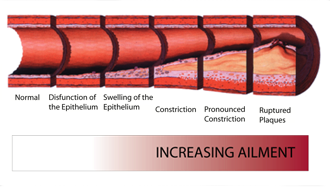

Diseases of the heart and blood vessels are the main cause of hospitalization and death in Western countries including Switzerland. Remarkable progress has been achieved in the last 50 years in the management of these patients. However, heart attacks remain the leading cause of death.
Most patients never experience symptoms before their first heart attack – it strikes them out of the blue (→ Eisenhower’s heart attack)! Some patients experience intense chest pain or shortness of breath, others may die suddenly.

The main reason for a heart attack (acute coronary syndromes – ACS) is rupture of a cholesterol-rich plaque within a major coronary artery. This key triggering event leads to formation of a thrombus and occlusion of such a vital blood vessel, thereby interrupting blood flow to the heart muscle with critical impairment of pump function.
Recent research from several groups, including ours, suggests that a surge of inflammation after an operation, excessive sports or other yet unknown stress factors may cause such an event. Indeed, in patients with a heart attack, white blood cells are recruited to the heart and release mediators of inflammation that weaken the plaque (vulnerable plaque) and eventually facilitate plaque rupture. Our analyses of coronary blood clots and blood samples from patients with acute heart attacks showed markedly increased inflammation around ruptured plaques compared with peripheral blood samples. Preclinical experiments have allowed us to identify novel molecules and the key inflammatory cells that promote growth of atherosclerotic plaques. As part of a bench-to-bedside approach, molecular imaging tools enabled us to visualize inflammatory activity within atherosclerotic plaques.

We plan to validate known and to identify novel mediators of acute coronary occlusion and plaque formation. These biomarkers will improve early detection and therapeutic strategies of this event. Moreover, our findings will set the stage for a better understanding of the main causes of plaque rupture. Other centers involved in this collaborative effort will test novel high-resolution imaging modalities, improve patient care and counsel health care providers, and test the role of novel repair strategies after myocardial infarction. Thereby, we anticipate that our findings will contribute to diminish atherosclerosis, reduce infarct size, and to improve outcome of these patients. Further information about this collaborative study is available at www.spum-acs.ch.
This multicenter project is supported by the Swiss National Research Foundation and hence was peer-reviewed. However, in order to achieve the exciting goals within this project, additional funding is required. In particular, measurement of the inflammatory mediators requires expensive assays and personnel such as a post-doctoral fellow, a doctoral student, and a technician.
Christian M. Matter, MD, Lukas Altwegg, MD, Roland Klingenberg, MD, Willibald Maier, MD